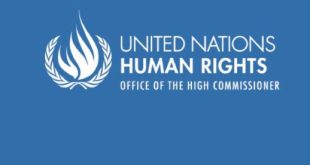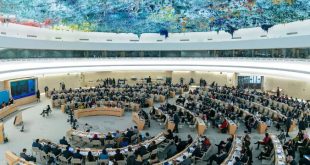 After nearly five years of violence that has displaced some 12 million people, some real talks are to be held to end the war in Syria, thanks to the military intervention of Russia.
After nearly five years of violence that has displaced some 12 million people, some real talks are to be held to end the war in Syria, thanks to the military intervention of Russia.
Russia is doing it its way, scaring the daylights out of the pseudo jihadists or pet terrorists of the West and the oil sheikhs while the space for the United States and its Middle Eastern allies to manipulate the crisis is getting smaller by the day.
The United States and other western powers are not unknown for their schemes where Islamic groups are used as catspaws to gain their foreign policy objectives.
During the cold war period, the US supported the opposition Muslim Brotherhood in Egypt when the then Egyptian President Gamal Abdel Nasser allied his country with the Soviet Union. Later, when the US wanted to defeat the Soviet Union in Afghanistan, it trained, armed and financed Islamic groups, including those that later formed al-Qaeda under the leadership of Osama bin Laden. During the foreign-powers-fomented Libyan civil war of 2011, US operatives worked closely with jihadi elements, including those who were close confidants of bin Laden. In Syria, the US is backing what it calls moderate rebel groups although many of these groups work closely with or have pledged allegiance to the terror group Islamic State in Iraq and Syria (ISIS a.k.a ISIL/IS/Daesh).
Now as Russia, which is directly hit by the Syrian civil war, has decided to go after the rebel groups in Syria, the United States is getting jittery, crying foul and, in desperation, calling for a timeout. As discussed in these columns in recent weeks, Russia, an oil-and-gas-exporting country, is severely hit by the plunge in oil prices and the economic sanctions imposed by the West because of its interference in the Ukrainian civil war. Russian oil companies complain their share of the European market – nearly two thirds — is being eaten up by increased supplies from Saudi Arabia, which is offering oil to countries like Poland at lower than the market price, in an apparent bid to punish Russia because of its support to the Bashar al-Assad regime in Damascus.
 Russia is also worried about a proposed pipeline to be built across Syria to take Saudi and Qatari oil and gas to Europe once the Assad regime is ousted and a pro-Western, pro-Saudi government is set up. This will further reduce Russia’s clout in Europe and deal a death blow to its wounded economy. Apart from economic sanctions and the oil weapon, Russia fears that the West and its Middle Eastern allies could destabilise Russia and Central Asian countries through their pet terrorists. These are some of the reasons why Vladimir Putin’s military intervention in Syria enjoys overwhelming support across Russia. Putin, a spy master during the Soviet Union’s KGB days, takes the existential threat to Russia seriously. This was evident in Russia’s war in Georgia. Putin did not take it lightly when Georgia sought membership in the North Atlantic Treaty Organisation (NATO). Putin saw a major threat to Russia’s security in NATO’s expansion towards the east. Putin warned Georgia, Ukraine and other states in Russia’s backyard that the expansion of NATO to Russia’s borders would be taken in Russia as a direct threat to its security.
Russia is also worried about a proposed pipeline to be built across Syria to take Saudi and Qatari oil and gas to Europe once the Assad regime is ousted and a pro-Western, pro-Saudi government is set up. This will further reduce Russia’s clout in Europe and deal a death blow to its wounded economy. Apart from economic sanctions and the oil weapon, Russia fears that the West and its Middle Eastern allies could destabilise Russia and Central Asian countries through their pet terrorists. These are some of the reasons why Vladimir Putin’s military intervention in Syria enjoys overwhelming support across Russia. Putin, a spy master during the Soviet Union’s KGB days, takes the existential threat to Russia seriously. This was evident in Russia’s war in Georgia. Putin did not take it lightly when Georgia sought membership in the North Atlantic Treaty Organisation (NATO). Putin saw a major threat to Russia’s security in NATO’s expansion towards the east. Putin warned Georgia, Ukraine and other states in Russia’s backyard that the expansion of NATO to Russia’s borders would be taken in Russia as a direct threat to its security.
Proving he meant what he said, Putin sent troops to Georgia in 2008 and carved out two independent pro-Russian regions – Abkhazia and South Ossetia. In March last year, when the pro-Moscow government in Ukraine was toppled in a coup sponsored by the United States and its Western allies, Russia annexed Crimea. Putin fears coups similar to what took place in Ukraine could happen in oil-and-gas-rich Central Asian countries and even in his own country, Russia. So he decided to strengthen Russia’s hold on Central Asia. Last week, in Kazakhstan, Putin, citing the spillover effects of the Syrian war and the yet-to-end war in Afghanistan, called for the setting up of a Nato-style joint task force comprising post-Soviet states to secure the borders of Central Asia.
Russia’s counter actions to deal with NATO expansion and to protect its strategic interests in the Middle East have placed a major strain on US security measures. This is because a good amount of Washington’s military resources have been deployed to contain China and protect its strategic interests in the Middle East. Needless to say, both China and Russia are in an advantageous position, with the US struggling to sustain two cold war type standoffs. China’s statements indicate that it is not opposed to Russia’s intervention in Syria.
As the cold war games over Syria intensify, the United States is now on the back foot. Washington probably did not expect a Russian intervention in favour of Assad when it (the US), together with its Middle Eastern allies, drew up the plan to oust Assad. Now that the Russians are in a big way in the Syrian war, turning Assad’s losing war into a can-win war, the US is resorting to diplomacy to achieve what it could not by fomenting a civil war. But the sticking point is Assad. The US wants him to go, but Russia says he should stay. With Russia flexing its military muscle, the US has little option but to compromise.
US Secretary of State John Kerry has called for an emergency meeting to save Syria from what he calls total destruction. Invited for this meeting today are Russia, Turkey, Saudi Arabia and Jordan but once again, like at all previous talks on the crisis, Syria is left out – a futile attempt to narrate the Arabian Nights story of the magic lamp without mentioning Aladdin. Kerry has said, “Everybody, including the Russians and the Iranians, have said there is no military solution, so we need to make an effort to find a political solution. This is a human catastrophe that now threatens the integrity of a whole group of countries around the region.”
Kerry’s statement appears to be a desperate attempt to salvage the situation which is fast slipping out of the US hands. When ISIS terrorists were capturing town after town in Syria, displacing half the country’s population, beheading captives, forcing women into sex slavery and destabilising the entire Middle Eastern region, the US did not see the situation as catastrophic. Only now and that too when the Russian military campaign has the pseudo jihadists on the run, Washington – probably at the behest of its mischief-making Arab allies — is making a plea for a political solution and beginning to say that Assad can stay on but only during the transition. This is a major policy shift driven by the Russian military campaign which is increasingly being seen as a game changer.
Buoyed by the advances the Syrian troops are making with the help of Russian air support, Assad on Tuesday took the US and its allies by surprise when he appeared in Moscow for a meeting with Putin. The visit, his first overseas trip since the war broke out in 2011, may have further infuriated the US. But it also shows that there is little information sharing between Russia and the US, and affirms Moscow’s position that there cannot be a magic lamp solution without Syria’s Aladdin.
Source: http://www.dailymirror.lk
 Sri lanka Muslims Web Portal Diversity and Inclusiveness
Sri lanka Muslims Web Portal Diversity and Inclusiveness



